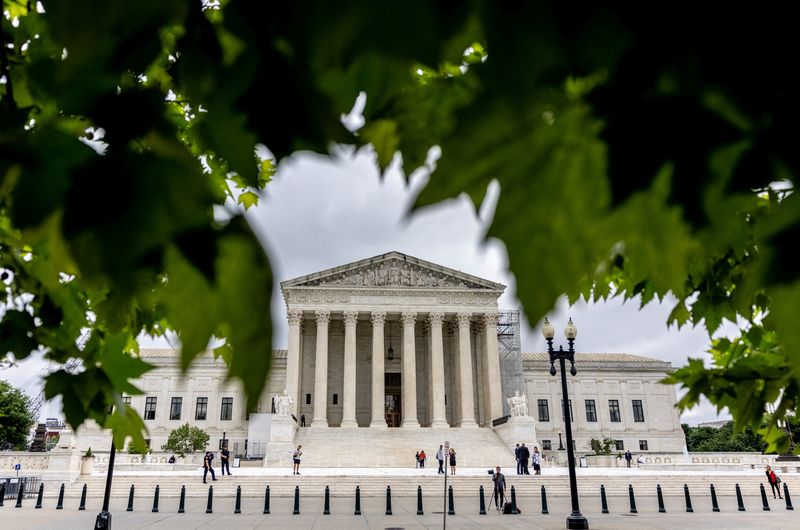(Reuters) - The U.S. Supreme Court's ruling on Thursday scuttling OxyContin maker Purdue Pharma's bankruptcy settlement could have a sweeping impact on how U.S. bankruptcy courts handle cases aimed at resolving sprawling litigation.
Here is a look at some ongoing bankruptcy cases that could be impacted.
CATHOLIC DIOCESES
More than two dozen Catholic diocese have filed for bankruptcy in recent years in the wake of an avalanche of lawsuits by childhood victims of clergy sexual abuse following changes in state laws that allowed new lawsuits to be filed for older sex abuse claims. The archdioceses of San Francisco, Baltimore and New Orleans, along with several large dioceses in New York state and California, are among the Catholic organizations currently in bankruptcy.
In the Purdue case, the Supreme Court said that U.S. bankruptcy law does not allow courts to wipe away legal claims against parties that have not filed for bankruptcy themselves without the consent of those suing them.
Outside parties often contribute funding for a bankruptcy settlement in exchange for a legal shield that protects them against current and future lawsuits. These so-called "non-debtor releases" originally arose in the context of asbestos litigation, but their use has become more widespread.
Without non-debtor releases that offer legal protections in exchange for settlement funds, Catholic organizations would be forced into a "destructive" choice, the U.S. Conference of Catholic Bishops said in brief it filed in support of Purdue. The choice would be, it said, to either pay less to survivors and allow "piecemeal litigation" to continue against other defendants, or go to through the "enormous waste and expense" of filing separate and duplicative bankruptcy proceedings for each Catholic entity that could be named in a lawsuit.
Protecting non-debtors from lawsuits is a "critical" part of those bankruptcies, enabling the dioceses to gather settlement contributions from insurers, parishes, Catholic schools and other organizations that may also be liable for the abuse claims, the brief from the Catholic bishops said.
The bankruptcy of the Diocese of Rockville Centre on New York's Long Island, already on rocky footing before Purdue, is an example of how critical, and how controversial, non-debtor releases can be.
In that case, abuse victims overwhelmingly voted down a $200 million settlement offer after their attorneys argued that non-bankrupt parishes and other Catholic organizations should contribute more to the settlement.
Those outside organizations provided $150 million of the Diocese's overall $200 million offer, and it was not clear whether they would kick in that kind of money without the promise of a non-debtor release.
BOY SCOUTS OF AMERICA
The Boy Scouts of America's $2.46 billion bankruptcy settlement of 82,000 sexual abuse claims could also be under threat, despite the fact that the organization exited bankruptcy more than a year ago. A relatively small group of 144 abuse claimants and some insurance companies have continued to appeal a U.S. bankruptcy's judge's approval of the settlement, and the Purdue ruling could give fuel to the settlement's opponents.
Boy Scouts of America, like the Catholic dioceses, used non-debtor releases to gather settlement contributions from other organizations that could be on the hook for abuse lawsuits, including insurers, local Boy Scouts councils and non-affiliated charities and churches that ran Scouting programs.
Those organizations contributed most of the cash for the settlement, while the relatively cash-poor national Boy Scouts organization contributed less-liquid assets like a collection of Norman Rockwell paintings that have been valued at $59 million.
Boy Scouts of America also filed a brief in the Purdue case, urging the Supreme Court to make sure that its ruling did not retroactively apply to older bankruptcy cases, saying it would be "deeply inequitable and practically impossible" to force a restart of settlement talks so late after the bankruptcy deal was approved.
OTHER MASS TORT CASES
The Purdue ruling will be broadly felt in mass tort cases, making it more difficult for debtors to gather settlement contributions from outside parties, like insurers and corporate owners, that also face liability for the lawsuits that drove a company into bankruptcy.

There have been fewer new mass tort bankruptcies this year, in part due to uncertainty over the Supreme Court's Purdue ruling and the high-profile dismissals of contentious bankruptcy cases initiated by wealthy corporations Johnson & Johnson (NYSE:JNJ) and 3M. But some older mass tort cases are still working their way through the courts.
Other active bankruptcies involving large numbers of lawsuits include pharmacy chain Rite Aid (NYSE:US90274J5618=UBSS), prison health contractor Tehum Care and fire safety company Kidde-Fenwal.